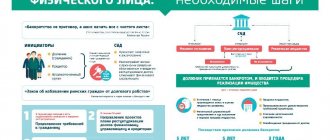Can a bankrupt travel abroad?
Every citizen has the constitutional right to move freely throughout the territory of the Russian Federation and beyond its borders, if this does not contradict the law and does not threaten state or public security. However, Art. 15 of Law No. 114-FZ of August 15, 1996 imposes a number of restrictions on travel for persons:
- admitted to classified information and state secrets;
- undergoing military or alternative military service;
- appearing as a defendant in a criminal case;
- under the influence of a court decision on restriction of freedom;
- evading payments under writs of execution;
- participating in the process of declaring them insolvent.
The law does not say anything about whether a bankrupt has the right to travel abroad. The legislative act provides for the possibility of restricting movement for debtors against whom proceedings have been initiated in the Arbitration Court.
Other possible prohibitions and restrictions
Based on Bankruptcy Law No. 127-FZ, restrictions may relate not only to whether a bankrupt can travel abroad. There are also a number of other requirements that are often applied by bailiffs:
- Any income, including wages, is subject to strict control by financial managers.
- There is no opportunity to take out any new loans, apply for a mortgage or credit.
- Any transactions the amount of which exceeds RUB 50,000 can be made only after obtaining consent from the financial manager.
Most debtors say from personal experience that the procedure ultimately only makes their life easier, not more difficult. Of course, there are some restrictions, but they are all aimed at making debts a thing of the past as quickly as possible.
0
Author of the publication
offline 17 hours
Ban on traveling abroad for bankrupts: who imposes it and how long does it last?
According to legislative acts, a ban on a bankrupt traveling abroad can only be imposed by an Arbitration Judge at the request of creditors or other participants in the process. Typically, lenders are afraid that the debtor will travel abroad and not return to the country, or will withdraw assets. To protect themselves from complete loss of money, creditors apply for an injunction.
The validity period of travel ban status is established by Law No. 127-FZ Art. 213.24, paragraph 3, which states that all prohibitions are lifted automatically after a verdict is passed, the status of insolvency is assigned, or after the parties reach a settlement agreement.
In what cases and when are restrictions on movement imposed?
Travel outside the Russian Federation is limited to debtors in two cases:
- If there is a debt in the amount of more than 10 thousand rubles. (since October 2020, for a number of debts, the minimum debt value has increased to 30 thousand rubles).
- The specified debt must be confirmed by judicial acts or initiated enforcement proceedings.
Restrictive measures can only be imposed by bailiffs. Banking institutions and collectors cannot establish a ban.
An individual can obtain information about the conduct of enforcement proceedings against him on the bailiffs website. Information about this fact is in the public domain and can be found on the website fssprus.ru.
The very fact of open enforcement proceedings does not mean the presence of restrictions on travel . A specific list of actions towards the debtor in order to encourage him to voluntarily pay the debt is determined by the bailiff authorized to conduct the case.
Initially, the restriction is introduced for six months, and these periods can be extended at the initiative of an FSSP employee. In order to lift restrictive measures, the debtor must pay off all debts or wait until the end of enforcement proceedings due to the impossibility of collection.
Another way to remove restrictive measures and write off debt is to go through the procedure of declaring an individual financially insolvent. Once bankruptcy proceedings have begun against an individual, all enforcement proceedings are suspended when debt restructuring is introduced or terminated at the stage of property sale. That is, if the debtor had a travel ban as part of enforcement proceedings, then when the implementation stage is introduced, it is lifted.
But it must be taken into account that when introducing a procedure for the sale of property in relation to a person, the competence of the arbitration court also includes introducing a ban on the bankrupt traveling abroad . Such a prohibition is not mandatory in bankruptcy cases and is established at the discretion of the arbitration court. According to established practice, courts rarely impose such restrictions on their own. Usually the initiative comes from other participants in the case: creditors or the financial manager. The judge must consider the petition received from them for validity and only then makes a decision to refuse it or to impose a ban on the debtor.
An example is bankruptcy case No. A53-1344/2016. In it, the creditor applied to the court to impose restrictive measures against the debtor. He motivated his position only by the fact that the individual’s debt to him is very significant and amounts to more than 6 million rubles. The court found the introduction of restrictions based solely on the amount of debt unfounded and denied the petition.
Thus, the court must have very compelling reasons to impose a ban. The right to impose a ban by an arbitration court is given in Art. 213 clause 24 127-FZ. It says here that the ban imposed on the debtor is canceled upon the occurrence of one of the following events:
- The parties signed a settlement agreement.
- The citizen received bankrupt status.
- A decision was made to terminate court proceedings.
How to lift a travel ban for a bankrupt?
The restriction of movement is completely lifted if:
- a settlement agreement has been reached;
- the debtor has covered all monetary obligations to creditors;
- The court decided to grant bankruptcy status and write off all debts.
What to do if bankruptcy of individuals is initiated, and traveling abroad is simply necessary? Is it possible to cancel a court decision and obtain permission to visit a foreign country? In paragraph 3 of Art. 213.24 of the Insolvency Law states that if there is a good reason, the court may change a previously made decision. These reasons include:
- death of a relative living in another state;
- business trip;
- the need for urgent treatment in a foreign clinic;
- studying at a university abroad.
In this case, the debtor must first draw up a written petition and send it to the creditors; if they approve the departure, then a petition is drawn up to the judge.
What the law says
Let's consider questions regarding what the law says: after bankruptcy, is it possible to travel abroad? There are cases when, in the event of bankruptcy of individuals, travel abroad will be prohibited. The restriction can be lifted by paying off all existing debts of the individual. The Federal Law “On the procedure for exit and entry from the Russian Federation” speaks of two reasons for introducing restrictions on departure from the country:
- Existence of debt over 30,000 rubles. and 10,000 rub. alimony debt.
- In situations of sale of property in bankruptcy.
The first case must be confirmed by a court act. And the ban is issued by a bailiff. This restriction will remain in effect until the end of the bankruptcy process. All this is regulated by the Federal Law “On Insolvency”.
Can a bankrupt spouse travel abroad?
If the spouse of an insolvent citizen does not fall under the definitions set out in Art. 15 of Law No. 114-FZ, there are no travel bans imposed against him imposed by bailiffs due to evasion of payments under writs of execution, he can freely leave the Russian Federation.
Even if the court decides to seize the joint property and include it in the bankruptcy estate, the presence of the second spouse at the trial is not necessary. Therefore, this circumstance cannot prevent travel.
Completion of bankruptcy and lifting of the ban
It is important to understand that there are a number of points that cannot be written off. These include alimony, injury to life and wages. In other situations, the procedure is completed by paying off the claims made by creditors. There are two main strategies used here:
- Debt restructuring.
- Sale of existing movable and immovable property.
In this case, all penalties, such as penalties and penalties, lose their force. The bankruptcy procedure ends with the complete write-off of unsustainable debt obligations, even in situations where they are impossible as a result of the sale of property.
Important! As for the ban on traveling outside the country, it is better to personally check whether it has been lifted.

To travel around the world safely, it is advisable to have permits
Traveling abroad after bankruptcy of an individual entrepreneur
When initiating the procedure for recognizing the insolvency of an individual entrepreneur, it is necessary to take into account that all debts are summed up: that is, the personal debt obligations of the citizen are added to the debts of the individual entrepreneur. If one of the creditors filed a lawsuit to collect the debt under the agreement and received a positive decision, he submits the writ of execution to the Bailiff Service. Bailiffs, in turn, have the right to seize accounts and impose a ban on traveling abroad.
The easiest way to get rid of restrictions on movement is to initiate bankruptcy of the entrepreneur. After a citizen-entrepreneur is declared insolvent, all debts will be written off and all prohibitions imposed by the bailiffs will be lifted.
How to remove travel restrictions
As noted earlier, when debts are written off, the sanction is automatically lifted. If, after making the payment, the restriction applies, you should file a corresponding complaint. The sanction is also subject to cancellation after the signing of the settlement agreement.
In any case, the debtor will have to pay. After repaying the debt, you must obtain a resolution from the bailiffs to lift the travel restriction.
Is it possible to lift the ban early?
The possibility of early lifting of the ban on traveling outside the country is provided for by the legislation of the Russian Federation in the following cases:
- need to go on a business trip;
- death of a relative living abroad;
- when the bankrupt is a student of a foreign educational institution;
- need to undergo treatment in another country.
How to legally write off debts
The procedure for writing off debts by law is complex and is accompanied by a number of nuances. Without a legal education, it is quite difficult to independently understand all aspects of the law and correctly apply them in practice. Sign up for a free consultation at Glav Bankrupt LLC - our specialists:
- will study financial documents and develop the most beneficial strategy for you;
- will tell you about all the possible consequences;
- will help preserve property from sale;
- will achieve 100% write-off of debts on loans, utility bills, traffic police fines, and taxes.
We helped more than 80,000 citizens in the Krasnodar region write off their debts.







